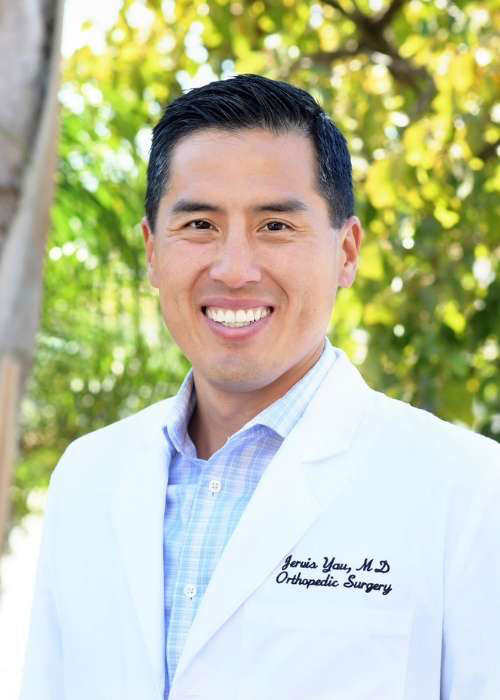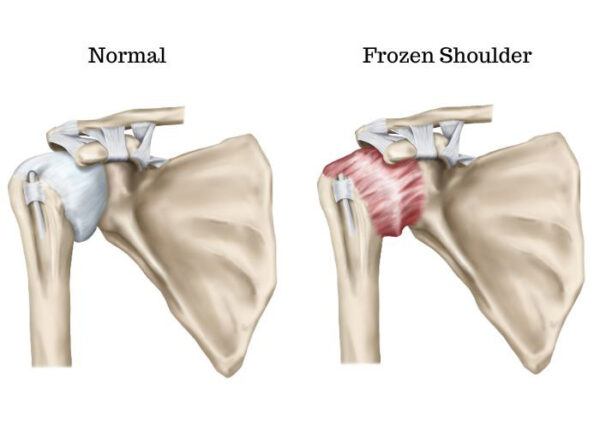Frozen Shoulder (Adhesive Capsulitis)/ Stiff Shoulder Specialist

Are you experiencing a stiff shoulder? If so, you may be suffering from a condition known as frozen shoulder. Frozen shoulder typically affects patients between the ages of 40 and 60 years, and females are much more likely to develop this condition than males. Sift shoulder specialist, Dr. Jervis Yau provides diagnosis and both surgical and nonsurgical treatment options for patients in Santa Barbara who have developed frozen shoulder. Contact Dr. Yau’s team today!
What is a Frozen Shoulder (Adhesive Capsulitis)?
Frozen shoulder, otherwise known as adhesive capsulitis, is a common shoulder condition that causes chronic pain and restricts normal joint function. This condition is commonly due to an unknown cause and therefore called “idiopathic.” However, trauma, overuse, and surgery can also lead to adhesive capsulitis. The loss of motion and pain is due to inflammation and scar formation of the joint capsule. Dr. Jervis Yau, Santa Barbara, Goleta, Santa Maria and Ventura, California orthopedic shoulder specialist, will diagnose and treat frozen shoulders in order to restore function to the shoulder.
Idiopathic adhesive capuslitis usually starts gradually and progresses through three stages:
- Freezing- Patients experience more and more pain with increasing loss of mobility, usually the first 6-12 weeks.
- Frozen- The pain improves but the stiffness remains, usually lasts from 3-6 months.
- Thawing- Shoulder movement improves and patients can return to normal activities over time, usually takes 6 months to 2 years.
What are the Symptoms of a Frozen Shoulder?
The hallmark symptom of adhesive capsulitis is the inability to move the shoulder, caused by the joint capsule becoming tight and scar tissue forming. Loss of range of motion is generally accompanied by pain that is typically worse in the early stages of the condition.

How is Frozen Shoulder Diagnosed?
Dr. Yau will make the diagnosis based on a thorough history and physical examination. During the physical examination, Dr. Yau will test both passive and active motion. Both ranges of motion are limited in patients affected by adhesive capsulitis. X-rays and MRI scan are commonly obtained to confirm the diagnosis and rule out other causes of stiffness.
How is Frozen Shoulder Treated?
Frozen shoulder gradually improves without treatment and may take up to 2 years for the condition to resolve. The overall goal of treatment is to help patients regain range of motion and decrease pain more efficiently.
Non-Surgical
Dr. Yau begins adhesive capsulitis treatment through conservative measures, such as rest, ice, anti-inflammatory medications and physical therapy. Cortricosteroid injections may be recommended to shorten the duration of the disease.
Surgical
Those who fail conservative treatment may go onto surgery. Dr. Yau will typically start by performing a frozen shoulder treatment manipulation under anesthesia. In refractory cases, an arthroscopic capsular release will be performed to debride the scar tissue within the shoulder joint capsule. Aggressive physical therapy will be initiated right after surgery to maintain motion.
For additional resources on adhesive capsulitis, or to learn more about frozen shoulder treatment, please contact the orthopedic practice of Dr. Jervis Yau, shoulder specialist located in the Santa Barbara, Goleta, Santa Maria and Ventura, California area.